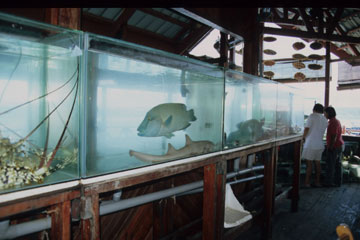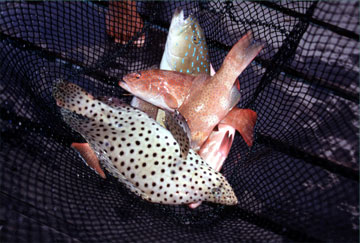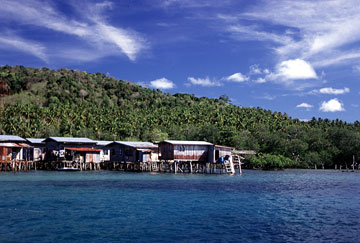Live fish trade causing massive depletion of coral reef species
Live fish trade causing massive depletion of coral reef species
Rhettt A. Butler, mongabay.com
January 24, 2007
According to a new study conducted by Cambridge University researchers off the northern coast of Borneo, the live reef fish trade is having a major impact on marine populations.
While the trade — which consists of fish being collected from coral reefs, shipped thousands of miles, then cooked live as a delicacy in upscale restaurants — is booming thanks to a rapidly swelling middle class in Asia, the new study suggests that high prices are driving ever greater rates of depletion from distant tropical reefs.
Analyzing data from three traders in the town of Kudat in northern Borneo, the researchers found a dramatic drop in the populations of target species, including a 99 percent plunge for the Napoleon wrasse (Cheilinus undulatus) and an 81 percent fall for the bluelined grouper (Plectropomus oligocanthus) during an 8-year period.
 Live fish restaurant in Kudat (Photo by Helen Scales) |
“We found significant exponential declines of several coral reef fish species… targeted by the [live reef fish trade] in northern Borneo, which we interpret as the first quantitative evidence indicating severe population impacts of the trade,” the researchers wrote. “These declines took place in under a decade and are especially worrying given the mobile nature of the Kudat fishing fleet, since it is probable that vessels shifted range when nearby populations became depleted, thus maintaining catch rates for longer.”
Of even greater, says Dr. Helen Scales, a zoologist at Cambridge who now works with IUCN on fisheries issues and is the lead author of the study, is the live reef fish trade appears to be expanding.
“It is highly likely that these patterns of drastic overexploitation are being played out time and again in every country that hosts the live trade,” said Scales. “Our study published last year in Science, showed how every year the live trade spreads further from its main center, Hong Kong, as nearby reefs become depleted of desirable fish species. There are no-longer any coral reefs that are remote enough to be ignored by the live reef fish trade.”
While the depletion caused by the live reef fish trade in Borneo is particularly bad, Scales says an outright ban could be counter-productive by driving the trade underground. Instead she says the focus should be on increasing regulation of the trade, promoting consumer awareness, and better policing marine reserves that can serve as refuges for threatened species.
“We need to encourage consumers to realise their choices really count — ultimately we need to see increased demand for sustainably caught wild fish and for fish that have been reared sensitively in captivity,” said Scales. “We also need to see greater cooperation between countries to ensure that the numbers of fish being traded do not exceed levels that the reefs can sustainably provide.”
  Live fish catch and a fishing village in Northern Borneo. (Photos by Helen Scales) |
“That is particularly important for the rarest and most threatened species in the trade, the Napoleon wrasse, which is already protected on paper by an international agreement to manage its trade. But we still have a long way to go until we will see the trade in Napoleon wrasse being well below levels that jeopardise their future,” she continued.
“If we simply leave them alone, coral reef fishes have a fantastic capacity to recover from overexploitation. We still have a lot to learn about just how far individual fish as well as their eggs and larvae can swim or drift, but there is a lot of evidence that protecting coral reefs from fishing can lead to rapid revitalization of the ecosystem. The main problem is enforcing the fishing ban inside marine reserves.”
Andrew Balmford and Andrea Manica, also of Cambridge, were co-authors of the study (“Impacts of the live reef fish trade on populations of coral reef fish off northern Borneo”) which appears in the current issue of the Proceedings of the Royal Society B.